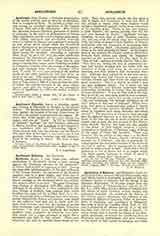www.catholic.com/encyclopedia/apollinaris-claudius-saint


Click to enlarge
Apollinaris Claudius, Saint, a Christian apologist, Bishop of Hierapolis in Phrygia in the second century. He became famous for his polemical treatises against the heretics of his day, whose errors he showed to be entirely borrowed from the pagans. He wrote two books against the Jews, five against the pagans, and two on “Truth.” In 177 he published an eloquent “Apologia” for the Christians, addressed to Marcus Aurelius, and appealing to the Emperor’s own experience with the “Thundering Legion“, whose prayers won him the victory over the Quadi. The exact date of his death is not known, but it was probably while Marcus Aurelius was still Emperor. None of his writings is extant. His feast is kept January 8.
T. J. CAMPBELL
Enjoying this content? Please support our mission!Donatewww.catholic.com/support-us

